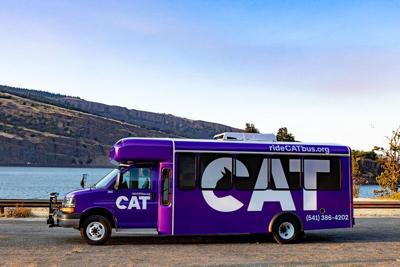HOOD RIVER — The new Columbia Area Transit Master Plan, which redesigns the CAT bus stops and routes for more consistency and accessibility, was the top item discussed at the April 17 Hood River County Board of Commissioners meeting.
Amy Schlappi, executive director at CAT, presented the preliminary master plan to the board of commissioners with detailed new routes and community outreach information.
They have been working on this new plan for around two years and after community advisories and surveys to collect local opinions and needs, the project is nearing completion, she said. Schlappi highlighted the main changes in routes with five areas of focus: Cascade Locks, the Upper Valley, the Upper Upper Valley, Hood River East, and Hood River West. CAT will also make changes to the styles of stops (standard, sheltered, or mobility hub) and the first-to-last mile access that many people struggle with.
“Our intent is to make it quicker, easier, and more convenient for people to use public transit. We want to better meet the needs of those community members who can’t access the main route,” Schlappi said. The final master plan is set to be completed by mid-May.
•••
Commissioners also expressed concern for unmaintained orchards, whether neglected or unoccupied, which could have negative affects for surrounding orchards in terms of wildfires, disease, and pest infestations.
Commissioners also briefly discussed a bald eagle’s nest found during a timber sale that required attention and adjustments, and the recent groundbreaking of Project Turnkey 2.0 in The Dalles. Additionally, the board approved funding for the Columbia Cascade Housing Project to maintain ownership of affordable housing units in Cascade Locks. In order to allow further research on the topic prior to discussion, the board also voted to move the County Strategic Plan Review to their meeting in May.
Two new county positions were also appointed: Matt Althoff was named to the County Budget Committee and Courtney Castaneda was appointed to the County Fair Board.
•••
Agreements about the new bi-state bridge are finally in the works since settling negotiations with the Port of Hood River. The board has been assembling a new committee for the design, funding and construction of the bridge, but issues with the use of bridge tolls by the port has slowed the process. Commissioner Arthur Babitz said he was cautious in regards to allocating funds to bridge maintenance rather than other projects that have been previously funded with this money, such as the airport and economic development, but the port has reached a resolution and bridge planning can continue.
•••
Attention has been growing in regards to marijuana growing stations in the county, as they are now allowed to offer samples and tours in regulated tasting rooms. Though still a new effort, the idea is essentially to offer a similar experience as wine tasting for individual marijuana strains and products at grow stations, as long as they follow the Clean Air Act and guests do not consume more than 3.5 grams in one tasting.
•••
The April 17 Board meeting also marked the official start to finding a new county administrator to replace Jeff Hecksel, who announced his retirement at the start of 2023. Steve Worthington of Prothman, a recruitment firm, spoke about the process and candidate recruiting they offer. Worthington is a current mayor with extensive background in city management and economic development, and he went into detail about the copyrighted process for job-specific profile building and interview rounds which the firm offers. With a rough five-week timeline for the initial outreach, the board should expect to review applicants by mid-June and actual hiring decisions or negotiations are expected to begin around July, he said.
•••
A public hearing was set for the Forest Carbon Project as the board works alongside the Climate Trust to further county forest acquisition as well as secure carbon credits for purchase. The Climate Trust estimates revenues from this carbon project to be around $23.9 million, which will be reallocated within the County Forestry Department and most likely used to purchase more forest land. Though timber value can fluctuate, the value of the carbon credits is secured by The Climate Trust and even insured against natural occurrences like disease or fires that may damage the land. The year-long draft for this project is in the stages of finalization and the public hearing will be the next step to verifying and marketing the county’s carbon credits.
Julius Passay, executive director at The Climate Trust, ensured the board that there are “lots of big companies willing to pay lots of money for carbon credits” and this is an opportunity for the county to more closely manage their forest land for the next 40 years.




















Commented